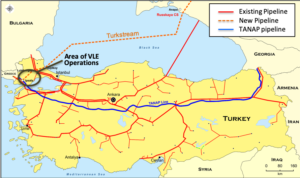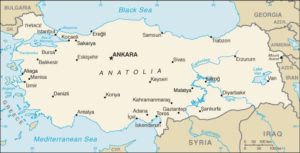Energy Infrastructure
BOTAS, a state company, owns and operates the national crude oil pipeline grid and the national natural gas pipeline grid in Turkey.
With regard to major natural gas pipelines, BOTAS owns and operates the national gas grid which connects essentially all the major population centres and is within easy access to the Company’s existing and planned operations in the Thrace Basin of north-western Turkey.

Pricing
Turkey imports more than 98% of its natural gas and 92% of its crude oil energy needs and as such any new production has a ready market. Consequently, the Company does not foresee any major concern with the marketing of crude oil or natural gas from its operations.
Crude oil pricing in Turkey is determined under the Petroleum Market Law No. 5015 (Gazetted on December 12, 2003). The pricing for the sales of crude oil is established according to the nearest accessible global free market condition. The domestic crude oil price is linked to world market factors with the base market price being the price at the nearest delivery port. Customary transportation and crude oil quality premiums or deductions, as the case may be, are applied to determine the crude oil price at the custody transfer point. Domestic purchasers and refiners are to give priority to domestic crude oil under the above pricing process.
Total natural gas demand in Turkey in 2018 was approximately 4.8 Bcf/d. BOTAS is the major importer and distributor of natural gas in Turkey. Although some import contracts have been released to private operators, BOTAS currently controls approximately 80% of Turkey’s natural gas imports. Given the very small domestic production of approximately 0.07 Bcf/d, there is a robust market for additional domestic natural gas production. Due to the dominance of BOTAS in the natural gas market in Turkey, the BOTAS pricing structure effectively sets the domestic market price. In 2018, Turkey imported approximately 98% of the natural gas it consumed, primarily from neighbouring countries. Accordingly the BOTAS cost tracks world reference pricing and in turn indirectly influences the price available to domestic producers, translated into TL, at some discount. BOTAS regularly posts prices in TL and increases or decreases its Level 2 wholesale tariff from time to time. The BOTAS Reference Price has averaged the equivalent of approximately US$6.70/Mcf over the last two years. BOTAS along with a number of other privately owned natural gas distributors in Turkey are expected to be the main potential purchasers of any new domestic natural gas production. The Company expects the BOTAS Reference Price to continue to be indirectly linked to the weighted average cost of imported gas to Turkey and government policy with respect to the level of consumer subsidies, if any.
The Company expects natural gas pricing under its current and future contracts to continue to be at some negotiated discount to the BOTAS Reference Price. The Company’s natural gas production from the TBNG JV lands are purchased by 49 local customers directly tied in to the Company’s sales gas distribution system at discount which has historically been approximately 2 per cent. to the BOTAS Reference Price. The Company’s natural gas production from the Banarli Licences is currently tied-in to the TBNG JV facilities and is being purchased by the TBNG JV, net of a transportation and marketing fee (of which Valeura receives 81.5% as a partner in the TBNG JV).





